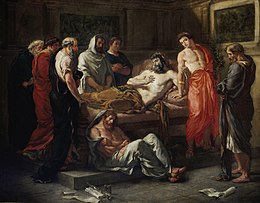Stoicism Roman Edition
Our evening of discussion on the legacy of Stoicism was engaging. How satisfying to spend time with friends, discussing according to our ability an ancient tradition that is deemed yet valuable. A consensus of the group was that living according to the nature of things, acceding to what is beyond our control, in order to address what remains under our control is a sane practice for day to day living.
Easy to say and hard to do. Reason with difficulty draws the dividing line between what is and what is not under our control. And then, there is the in-between, grey-area.

In a past session we discussed the Meditations of Marcus Aurelius. His sayings, perhaps from a journal, have left a positive mark upon my life. Marcus was beset with trouble from start to finish, despite being “high-born” to wealth and position in the Roman empire. He was serious minded, diligent to perform his duty though not of robust physical constitution. He spent a good deal of his reign at war on the frontiers, putting down revolts of the Germanic tribes. At the same time Rome was decimated by disease, likely smallpox or measles transmitted perhaps by trade with China or by returning soldiers.
Aurelius maintained his self-possession by adherence to a Stoic state of mind.
Here is the description of conditions during his reign taken from Wikipedia:
From 166-180 there was war with the Germanic tribes…..
The condition on the northern frontier looked grave. A frontier post had been destroyed, and it looked like all the peoples of central and northern Europe were in turmoil. There was corruption among the officers: Victorinus had to ask for the resignation of a legionary legate who was taking bribes.
Experienced governors had been replaced by friends and relatives of the imperial family. Lucius Dasumius Tullius Tuscus, a distant relative of Hadrian, was in Upper Pannonia, succeeding the experienced Marcus Nonius Macrinus. Lower Pannonia was under the obscure Tiberius Haterius Saturnius. Marcus Servilius Fabianus Maximus was shuffled from Lower Moesia to Upper Moesia when Marcus Iallius Bassus had joined Lucius in Antioch. Lower Moesia was filled by Pontius Laelianus’ son. The Dacias were still divided in three, governed by a praetorian senator and two procurators. The peace could not hold long; Lower Pannonia did not even have a legion.
All of this fell into the lap of Marcus Aurelius, who historians of later centuries would designate the last of the “good” emperors.
This morning I reviewed some of the saying of Marcus Aurelius taken from his Meditations:
The best revenge is to be unlike him who performed the injury.
This one hits home. In the current atmosphere of rising political polarization it is tempting to “gives as good as one gets,” to reply in kind. I know better but responding to verbal attack with a violent salvo of one’s own can be rationalized. Marcus Aurelius was right.
When you arise in the morning think of what a privilege it is to be alive, to think, to enjoy, to love …
I cannot imagine a more healthful first thought to have upon rising in the morning. This note of thanksgiving is sure to color the rest of the day.
The first rule is to keep an untroubled spirit. The second is to look things in the face and know them for what they are.
One’s own spirit is always in our control, even when that is with difficulty. Cultivation of a untroubled spirit is a pivot point. Secondarily looking at ones circumstances in the face, is a first step to seeing things for what they are. How easily my imagination drags me behind the notion that things appear worse than they are.
The memory of everything is very soon overwhelmed in time.
I do not think that Marcus Aurelius worried about leaving monuments meant to be eternal reminders of his reign. He is better remembered through his Meditations than by the monuments erected by others to his memory in Rome.
What we do now echoes in eternity.
I have thought about this line many times over the years. The quote of seven words were spoken by Maximus to his troops before going into battle in the opening scene of the Riddley Scott movie, Gladiator. Maximus, before leading the charge, knows that many of his troops will not survive the battle.
Live or die, what we do now echoes in eternity. That is enough.